Certainlies
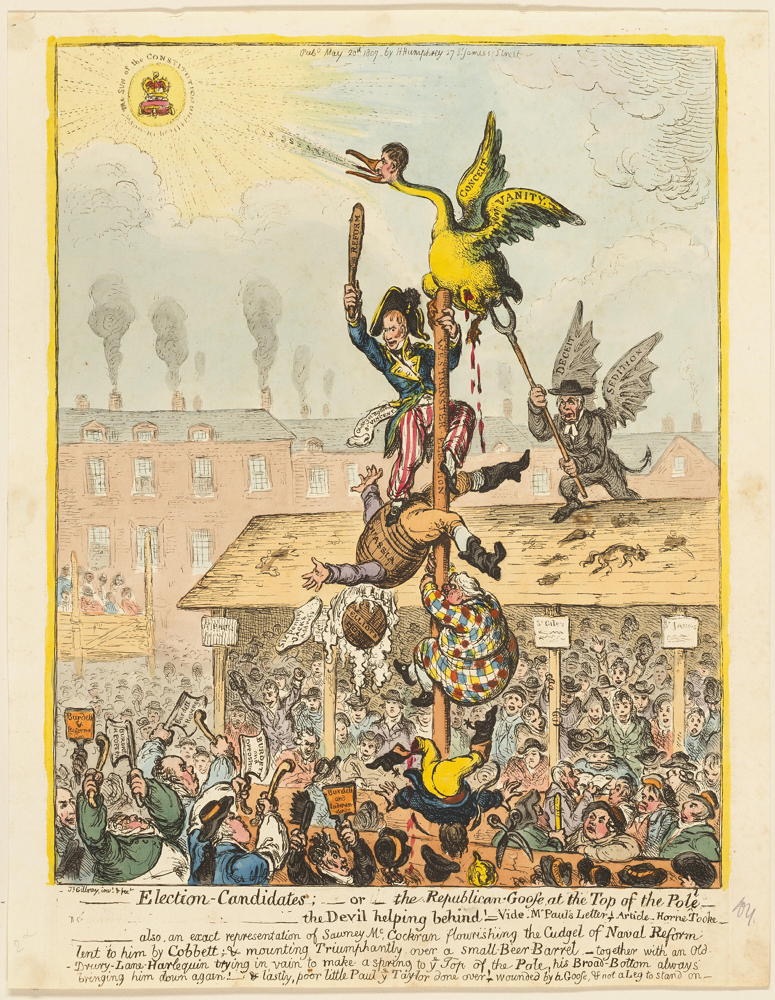
James Gillray: Election Candidates
(published May 20, 1807 by Hannah Humphrey)
ABOUT THIS ARTWORK
Despite its jovial hand coloring, James Gillray’s response to the 1807 parliamentary election in the district of Westminster caricatures real candidates with ruthlessness. Here, Gillray implied that the winner, the radical Sir Francis Burdett, had extra help. Burdett becomes the goose atop the pole, supported by a demonic figure with a pitchfork, while the agitated constituency below degenerates into a mob.
" … can't see how this latest experiment in degenerative Democracy can go any way but sideways."
The first of The Stupidities I introduced in yesterday's missive deserved to be Certainty; for Certainly, Certainty must be the primary difficulty of our age. Every age preceding us complained about the complexity of their situation, and should have. Each successive generation could rightfully complain about their age's complexity, which might mean that our world has become increasingly complex. Suppose the purpose of civilization was ever to somehow tame this native context each generation faces. In that case, civilization has utterly failed because it seems that it has managed only to amplify complexity rather than attenuate it.
Perhaps because of this, the urge for simple solutions seems to grow with each successive generation.
Stupidities
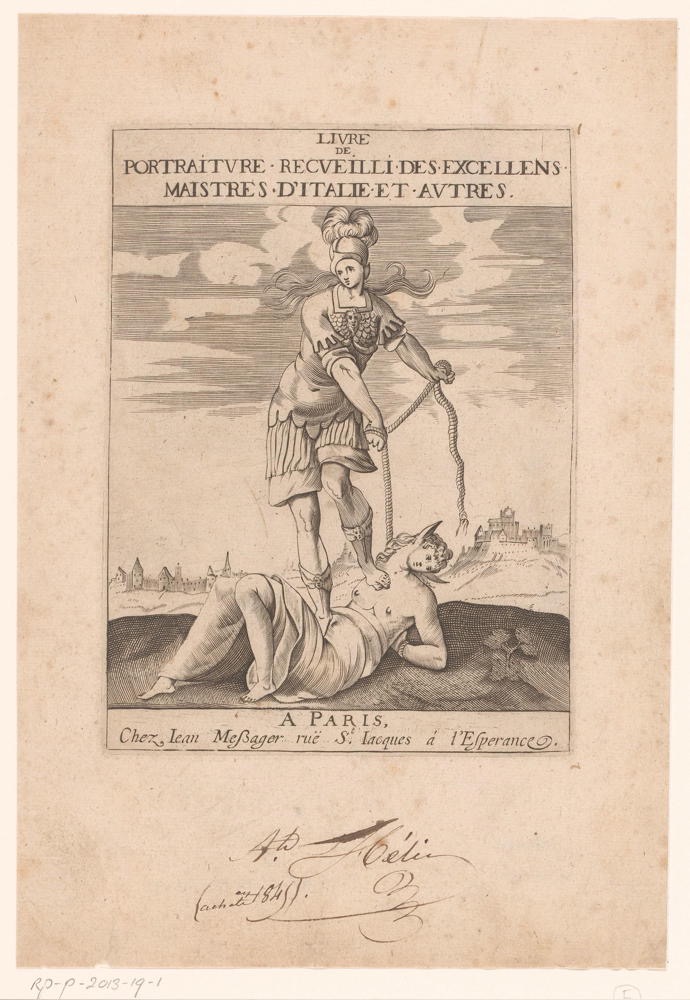
Jean Dubrayet*:
Minerva bindt de Domheid vast met een touw
[Minerva ties the Stupidity with a rope] (c. 1627)
Titelpagina voor een boek met tekenvoorbeelden.
[Title page for a book with drawing examples]
*"Jean Dubrayet was a print maker who is known for works such as Minerva ties the Stupidity with a rope and Portrait of Ajax." (Google AI experiment) I could find no other biographical information on this artist.
" … the trinkets with which our future was purchased."
It might be that history has always been a slave to the Stupidities. When I was still very young, I remember my more ancient elders wondering how their world would get along with the quality of young people coming up to eventually replace them. The young have always known nothing, and to those who knew everything in their time, they unavoidably seem relatively stupid. Youth tend to master stuff that seems meaningless to their elders. Our own Grand Other was showing off her gaming computer, a gift she and her dad built together as a Christmas present. She was proudly displaying the high-quality graphics, which I could barely see. I was thinking that the old text-based Adventure® game I used to play back on that 360 clone in the 70s had far better graphics, and it was text-based. I lasted a few seconds before I excused myself and went to wait for The Muse in the car. It disturbed me deeply that our Grand Other would somehow tumble to such stupidity! (She belongs to an after-school sports team at her high school. Her sport is, and I kid you not, competitive gaming!)
I'm ordering handbaskets.
UnSerious
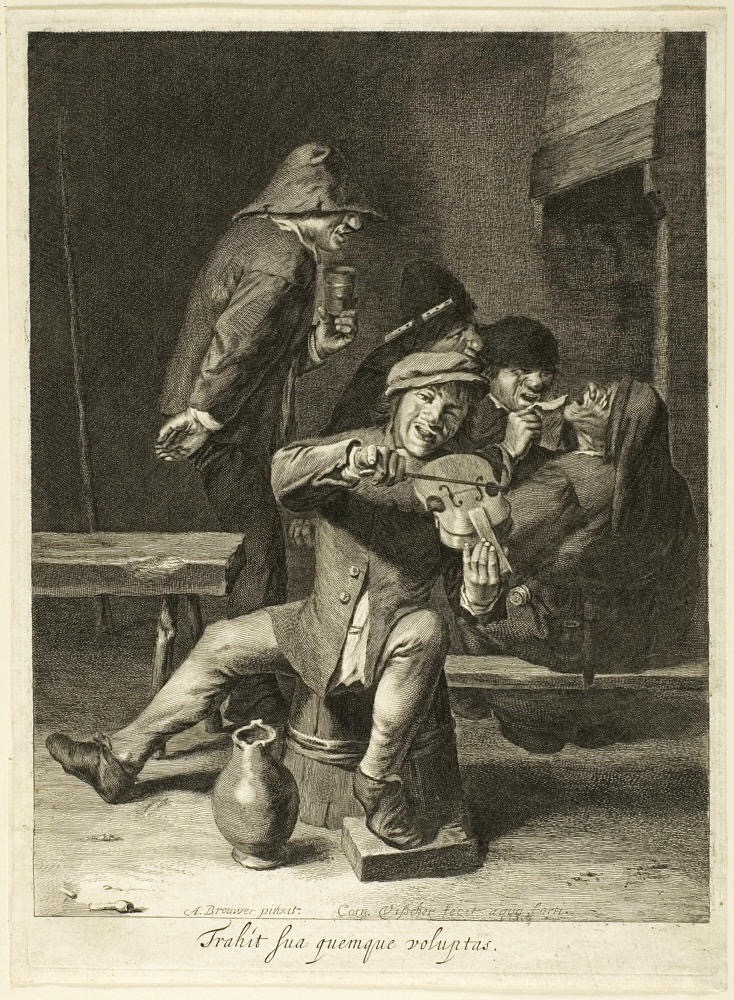
Cornelis Visscher after Adriaen Brouwer:
Hearing [De Fiool Speelder] (c. 1649-58)
"We seem poised to reenter kindergarten, where the bully holds the pulpit."
We console ourselves by remembering how inept he was the last time he was in office. He managed to use his office to be cruel to innocents, to unconscionably waste resources, and to inflate the deficit toward no discernable end. Still, he mostly proved incapable of inflicting long-term damaging influence. The office of the Presidency quickly snapped back into respectability once he was ousted, even with him endlessly whining that he'd been illegally overturned. He provided nothing that any court considered proof of his assertion. He proved to be an eminently ignorable distraction, a sore loser, and the most UnSerious candidate ever to seek re-election. That he won astounded everyone I know.
This time, he will be the most UnSerious President in the history of this nation.
Surrealizations
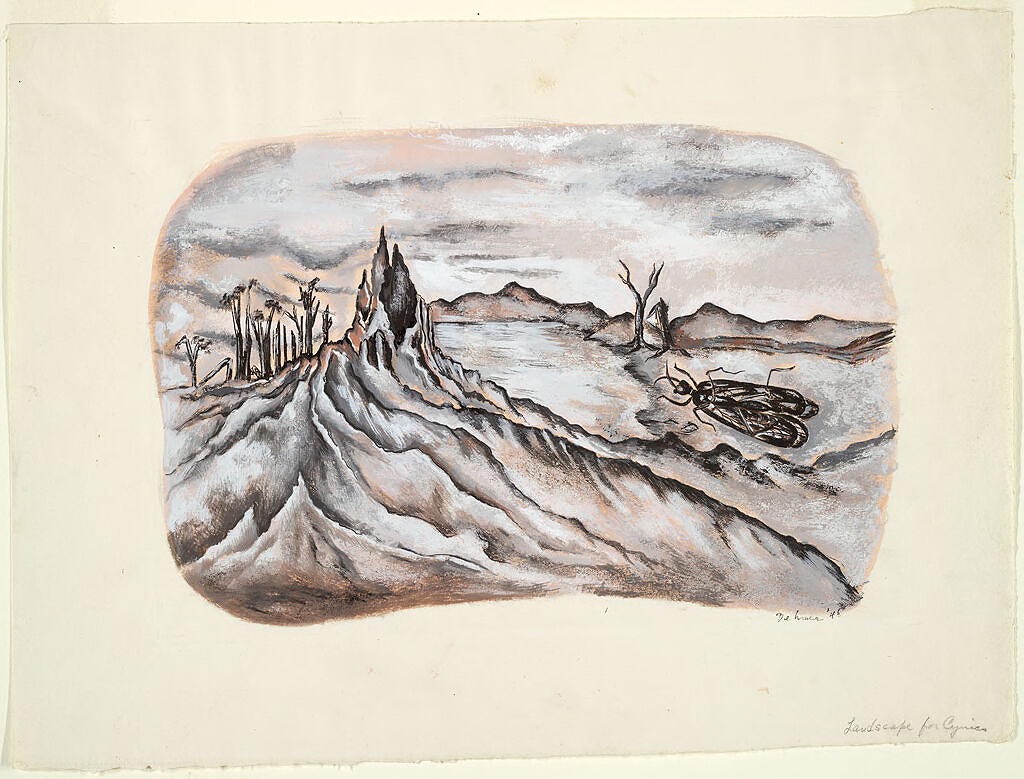
Dorothy Dehner: Landscape for Cynics (1945)
"Merry Christmas might take any of a variety of meanings in any NextWorld."
When The Muse and I bought our Villa Vatta Schmaltz, we imagined it would eventually become the center of many extended family gatherings. I imagined that when my kids had children, The Villa would naturally become the over-the-river-and-through-the-woods holiday destination of choice for them, as my folks' place had been for me and my family in my time, but it hasn't. Our twelve-year exile opened space for different patterns to imprint. By the time we returned, we remained as off the holiday radar as we had been when exiled in Washington, DC, and Colorado, both places too absurdly far away and lacking any history for the family to reasonably consider as holiday destinations. So, those generations imprinted on other places for the holidays, though I hadn't reimprinted on this NextWorld until this just passing Christmas.
My Christmas gift was the Surrealization that I had been living embedded in that past notion, that what I had tenuously believed would be the case twenty-some years earlier would likely still eventually come to pass.
Weekly Writing Summary For The Week Ending 12/26/2024
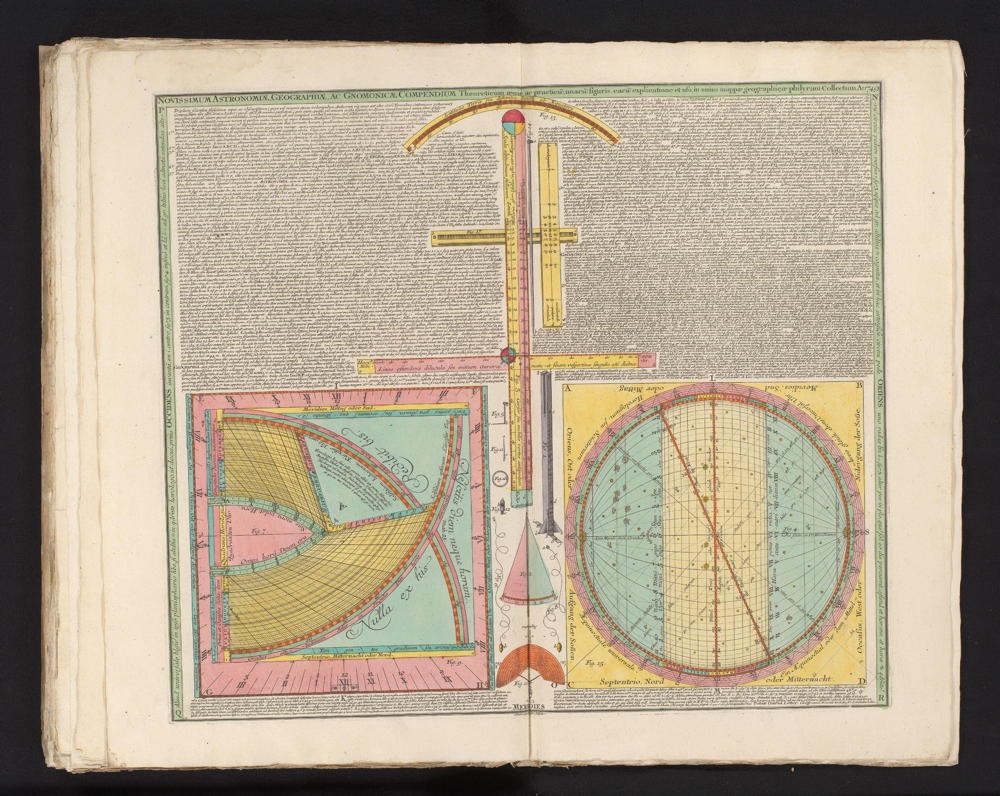
Tobias Conrad Lotter:
Astronomische theorieën en uitleg
[Astronomical theories and explanation] (1749)
Adequately Chilling
The first week of Winter brought Spring-like weather with Chinook winds and more rain than we've seen since last Spring. We've had three bomb cyclone systems bump into our coast since Halloween, each bringing fierce wind and much-needed rain. The Winter Wheat, already sprouted in the fields, has gotten a great head start. Our wheatfields sport Spring Green cover while we continue waiting for our first killing frost. I still have last summer's petunias, geraniums, and roses, which are still blooming. I sank the fuchsias into a composter bin; they seem secure enough for now. Winter has not come yet. Moreover, our usual weeks of numbing fog mostly missed us as those wet and windy systems repeatedly scoured our valley. I began a new series this week that has yet to reveal its purpose. After the terrifying results of last Fall's elections, I needed something more positive than politics to focus my attention on. I anticipate a period of great upheaval, even tragedy. I needed to clean out my backlog before taking on another initiative. Winter might not come this season, but the events unfolding on the world's stage threaten to be adequately chilling. I worry about our NextWorld.
UnProcrastinating
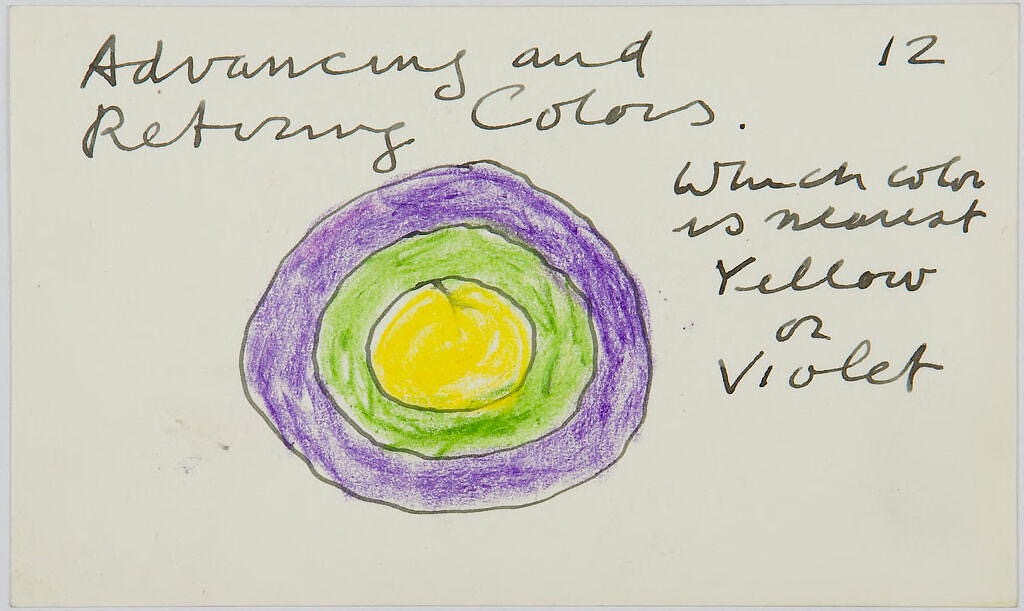
Stuart Davis:
Advancing and Retiring Colors Diagram (1942)
" … I can accomplish virtually anything."
Almost four years ago, when we moved back into The Villa Vatta Schmaltz after a twelve-year absence, we just crammed some stuff into whatever corner availed itself, particularly in the basement. Then, life regained momentum, and we didn't find a reason to retrace our earlier decisions. Clogs resulted. Particularly in my basement shop/laundry room, the clutter predominated. I'd just splayed most of my tools along the vast workbench top and worked around that mess. A month ago, I took positive steps toward eradicating that embarrassment. I hired Kurt, our painter, to refinish a peeling back wall, and I pivoted some of the shelving ninety degrees to provide space along its backside for pegboard, where I imagined I could mount my hand tools for tidy and convenient access. Painting done, I've not yet started moving back into the freshly refurbished space.
I am in the process of UnProcrastinating, with the explicit intention of creating a fresh context, if not a NextWorld.
Distinctioning
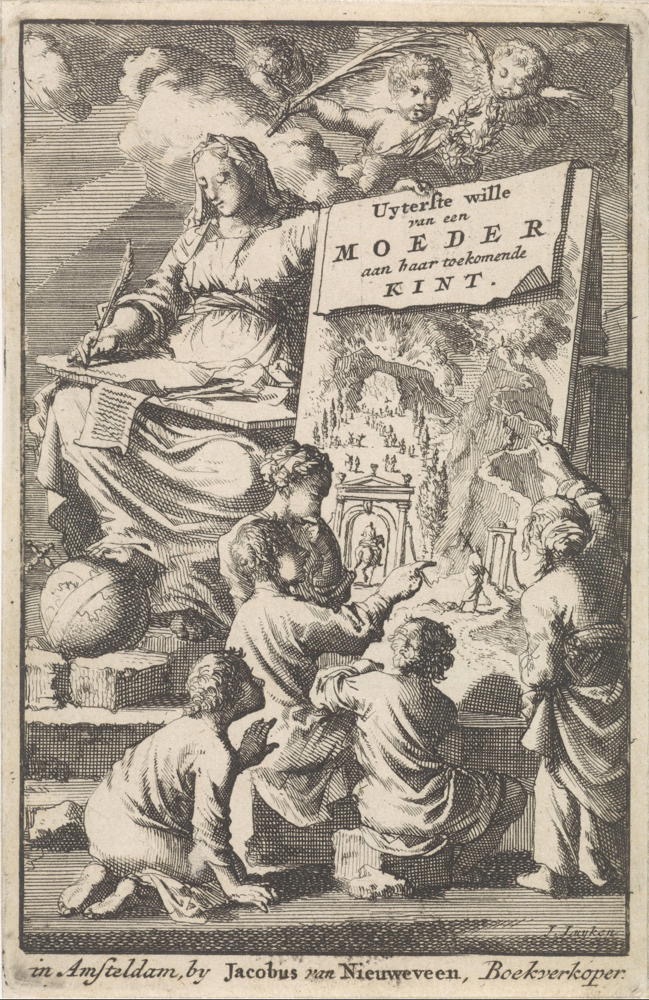
Jan Luyken: Vrouw Wereld toont kinderen de brede en smalle weg
[Woman World shows children the wide and narrow road] (1699)
" … largely unexplored."
When might this NextWorld appear? From here, the answer to this question seems to depend upon what one considers a distinction between one world and a next. What change, one to another, might qualify as enough to accept it as a genuine difference? I know, this seems awfully subjective. Some people maintain stricter standards than others. It might be that those who acknowledge slight differences as constituting distinctions experience more successful lives, for they might more comfortably manage to "change the world." Those who hold the strictest standard when making such distinctions live in a world that, by self-imposed definition, must always stay the same.
But aren't some changes more obvious?
Faith-Based

Jehan Georges Vibert:
Trial of Pierrot (Not Dated - late 19th century)
"I will have levitated by the means of tugging up on my own shoelaces."
I might be one of the least religious people you could ever meet. I don't have much particular animosity toward religion, only that I don't belong. Their lore doesn't interest me much, and their metaphors tend to lose me. For instance, I will never understand the concept of a personal lord and savior. I cannot understand what that phrase means nor imagine what such a service if competently performed, would even look like in practice. I never bought into the idea of original sin, either. I appreciate the good works various religious bodies perform. I am rightly appalled by the evil organizations engage in, seemingly as a matter of course. Any collection of individuals organized together becomes capable of evil far exceeding any individual's potential. I believe that groups must be more careful lest they inflict unintended damage on others. The notion that one collection of people is necessarily superior to another due to their beliefs disgusts me.
All that said, I acknowledge that my life has been a Faith-Based initiative.
ThinkingIll
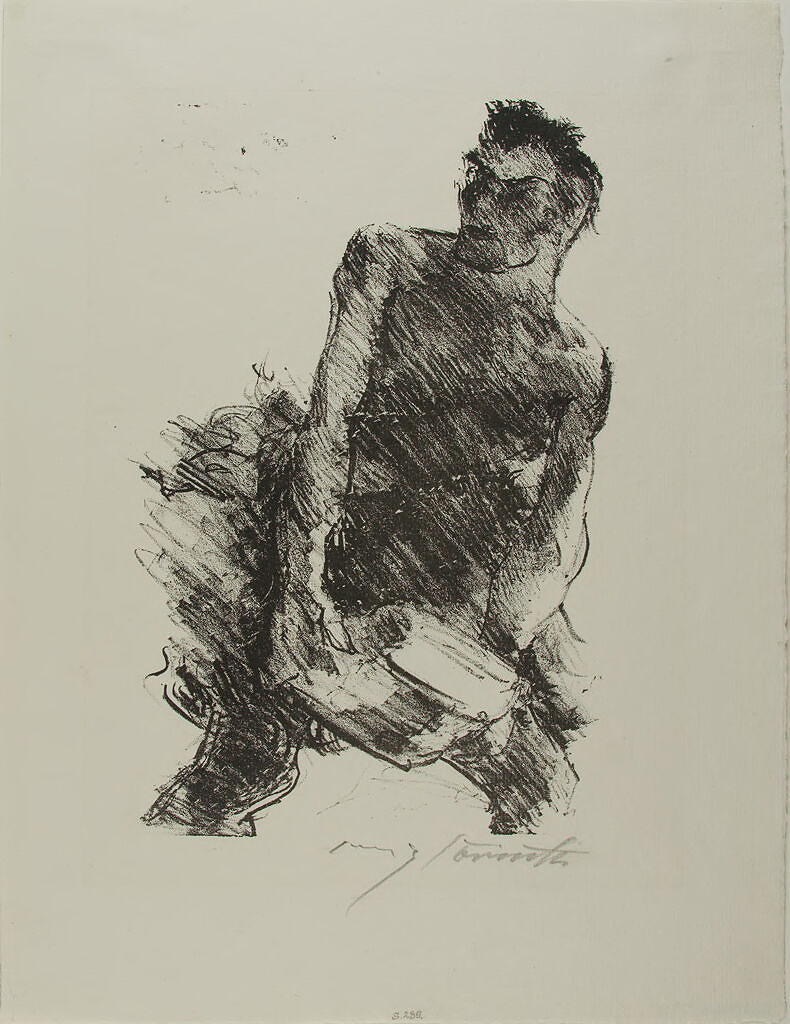
Lovis Corinth: Cain (1916)
"No whining!"
Two days into creating my Christmas Poem Cycle and halfway finished, I encountered a definite blockage to completion. I caught myself seething inside. I have been holding an anger, and the old, probably incorrect definition of depression was "anger turned inward." The idea apparently was that inward-aiming anger might fester into deep self-destructive sadness while anger aimed outward might at least dissipate, perhaps even harmlessly. But we live in an era when anger has turned outward, which has resulted in considerable carnage. School shootings seem to have become a daily occurrence, and what are those but outward-focused angst? You must have played hooky through those years if you were not seething through middle school.
My challenge as a poem writer involves poisoning the well.
WritingPoems
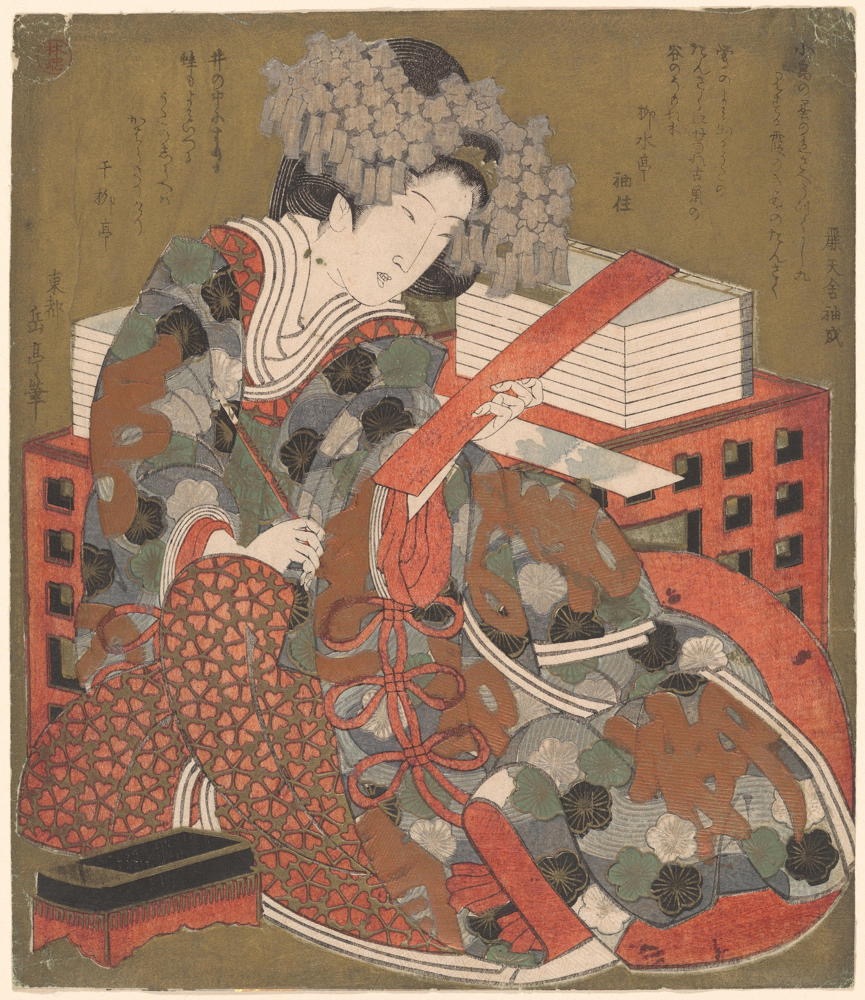
Yashima Gakutei:
Woman About to Write a Poem (c. 1824)
" … not the definition of insanity but of quality."
Every year, as Christmas nears, I find myself stuck to my desk WritingPoems. Years ago, I solemnly swore to stop buying presents in stores. I'd had it with that despondent shuffle exhibited by people hoping to find that perfect gift while having no real ideas about what such a gift might entail. That annual desperation of hoping a pre-Christmas miracle might appear in an overcrowded aisle. The passion play involving the eternal search for perfection, demanding faith and devotion yet often fruitless. It might be that perfection cannot be successfully sought but can only happen unbidden. Anyway, I'd had it and swore off that curious addiction. I would henceforth write poems and give them as gifts.
After more than twenty years of experience, I can't say that WritingPoems has necessarily been easier than shopping would have been.
NextWorld
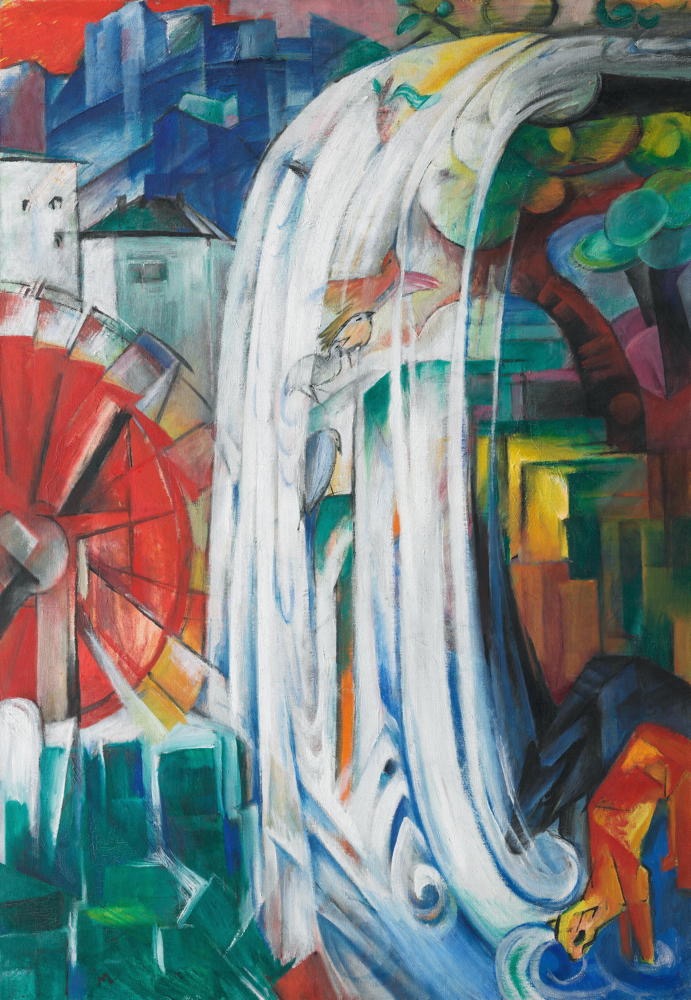
Franz Marc: The Bewitched Mill (1913)
"I guess I'll keep watch and see if I can catch a NextWorld emerging."
The inescapable ignorance of youth and the inevitable arrogance of age conspire to mislead most into believing that youth possesses innocence and the elderly own prescient wisdom. What could prove to be further from the truth? Youth has never been able to hear its elders, let alone understand them. The elders innocently expect their broadening experience to amount to something when it rarely does. Youth insists upon making its own mistakes and elders have little with which to trade but their undervalued perspective. The NextWorld, the one continuously emerging, has never turned out to be as anticipated or similar to what came before. Forced to poke sticks into darkness, civilization continually moves onward, if not necessarily forward.
I have little to offer in the way of advice.
Weekly Writing Summary For The Week Ending 12/19/2024
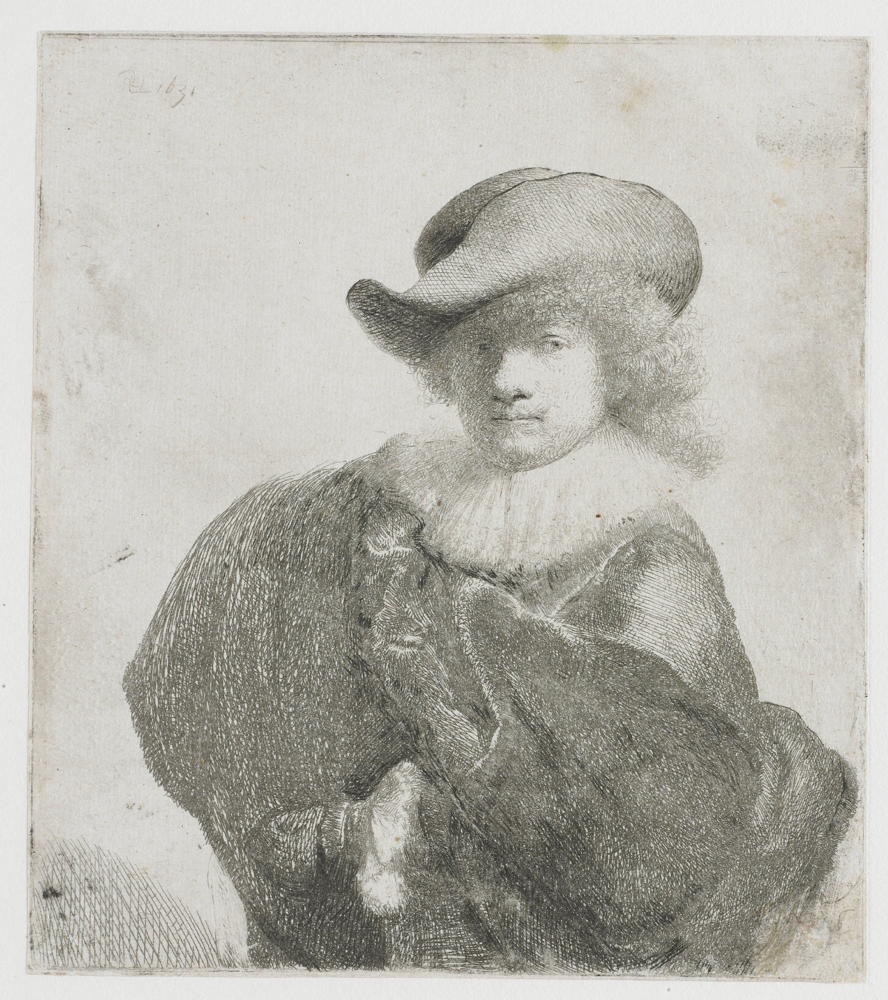
Rembrandt:
Self-portrait in a Soft Hat and Patterned Cloak (1631)
Tomorrow Morning's Problem
Someone I was chatting with at a holiday party asked me if I was retired. I'm never sure how to respond to that question because I don't consider myself retired, yet no one employs me. I responded by declaring myself a writer who puts in his daily hours. I don't know what I'd do if I retired. I still feel the deep need to create something every day and the responsibilities owning The Villa place on me. I continue to get up very early every morning to seriously consider what I should be doing that day. By the time The Muse rises hours later, I've already accomplished something, however modest. The balance of my day builds upon that early success. I rarely fail to achieve something of my own devising, early each morning. If I fear anything, I fear not accomplishing that something. I might suffer from some obsessive-compulsive disorder, except my world seems exquisitely ordered. I am free to procrastinate after I've finished my writing, and I procrastinate plenty, but I am never free to avoid my writing. Am I retired? Not hardly. I can't imagine myself ever hanging up my spurs.
As I finish another series, I ask myself if I have another one in me. The answer is an inevitable maybe. I cannot know until I've finished whether I have another in me. The honest answer would be that I didn't but that I didn't need to have another one in me before I started writing. What would become another one was never in me before I began but passed through me as I continued once I started. The starting primed the pump. The daily ritual maintained the flow. Knowing was never necessary or, I suspect, sufficient. There's no going back to recover what was never started. There's never a good enough excuse for not starting. I have not yet decided what my next series will focus on. That's tomorrow morning's problem.
Passing
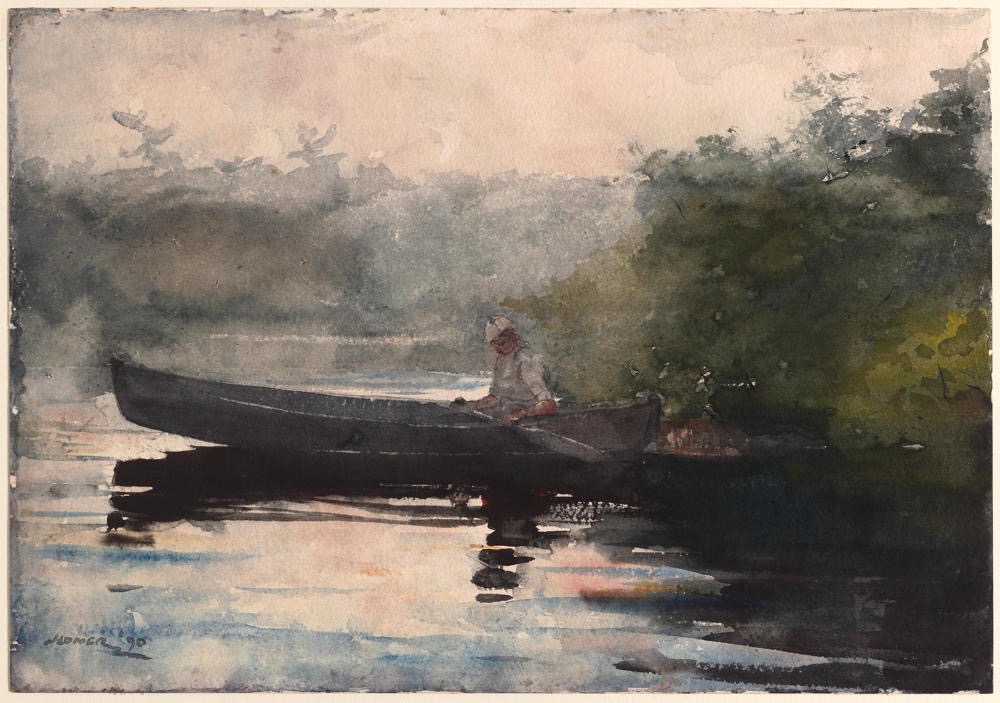
Winslow Homer: The End of the Day, Adirondacks (1890)
" … anyone Exiled never returns."
Our Exile didn't so much end as pass. In the same way, a person passing from life to death does not undo what they've accomplished; their story continues in their absence. As this series might have demonstrated, my Exile, our Exile, remains a prominent presence even now, three years after it passed. It continues Passing. I expect its Passing to continue until I pass, too.
The final few weeks away were excruciating.
PiecesOfMe
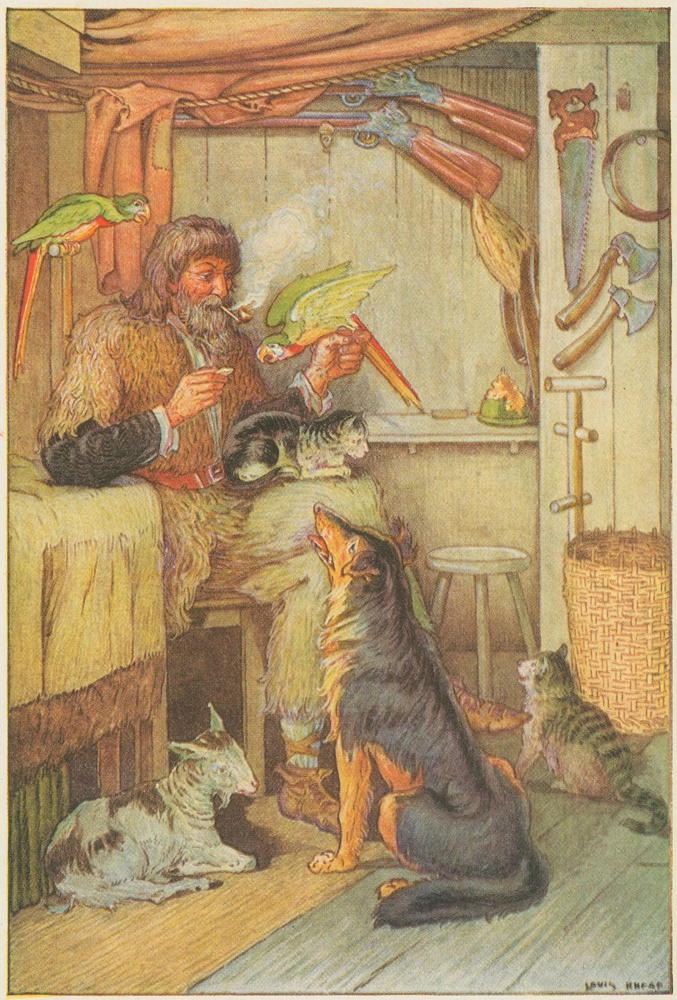
Louis Rhead:
I diverted myself with talking to my parrot (1900)
"Another Exile might be in all of our near futures."
These Exiled Stories have not just been about me, but actual PiecesOfMe. Everywhere we landed on our twelve-year odyssey, PiecesOfMe sloughed off and were left behind. By the end, I felt as though I had been pruned to within an inch of my existence. Though I supposed I was supposed to return with treasure, I returned immeasurable instead. What had I gained but some stories? What had become of me in my absence? Who was I supposed to have become? I returned dumber than I left and likely no wiser, either, for I had been absent the entire time. I'd learned a raft of things that have no practical application back in my homeland, even as generalized abilities. How could I apply my learned facility with public transportation in a place offering little of that? How would my learned tolerance for high humidity serve me when living on the edge of a vast desert? I returned with very little to show for my absence but stories.
Did my extended absence at least make my heart grow fonder?
LastAdolescence

Carel Christiaan Antony Last:
Meisje met Tulband [Girl with turban]
(1835 - in or before 1839)
"Once we were empty nesters again … "
More than a year before we returned from Exile, well after we'd comfortably settled into Colorado, The Muse received an urgent message from her granddaughter, our GrandOtter. The Otter had struggled since graduating high school, and even achieving that success had proven extremely stressful. All drama aside, and there had been ample drama from The Otter over recent years; she suffered from a baffling collection of diagnoses. One suggested she exhibited symptoms of some borderline personality disorder that seemed to me to have been an over-the-border one. Whatever the context, when The Otter contacted us, we couldn't help but respond, for she was our GrandOtter, and we'd considered ourselves an implicate part of her childhood and life. If she were in trouble, we'd respond.
It was always difficult to separate the real from the imagined with her.
Separations
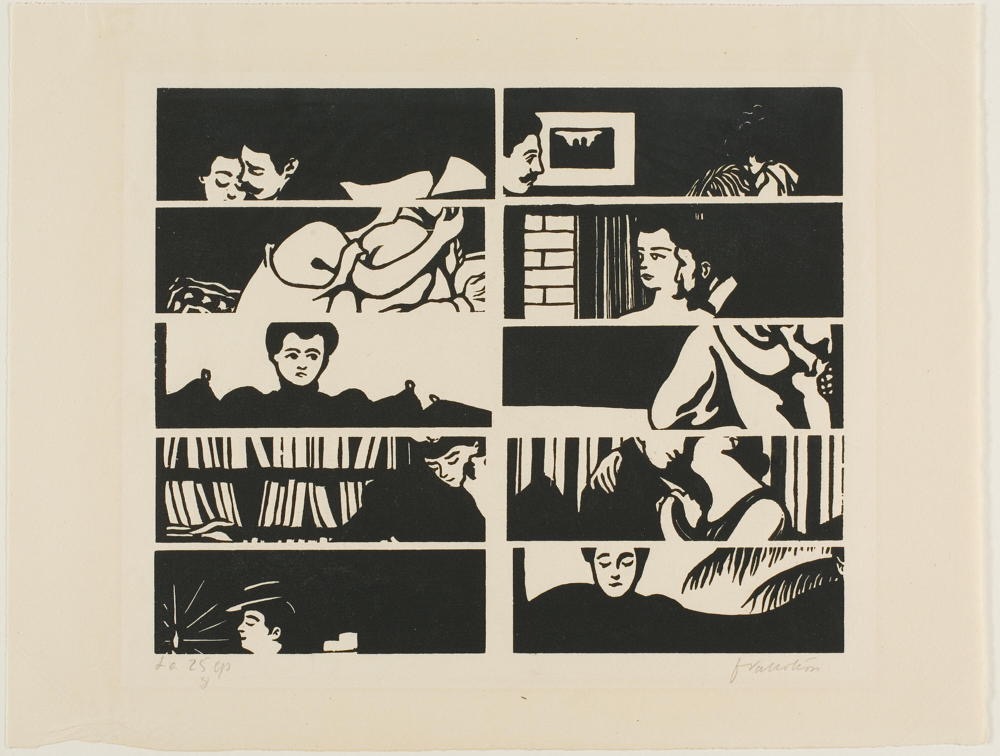
Félix Edouard Vallotton:
Cancellation sheet,
fragments of ten woodblocks from Intimacies (1898)
" … actively engaging in her separation dance."
We ended our Exile with several preliminary Separations, for we'd become connected, perhaps even addicted, to our Exile after more than a decade gone. We had been Exiled for almost as long as we'd been together before we were Exiled. The Exile threatened to outshine our prior experience together to become the new anchor. The shelf life of any Exile experience was never meant to outlast the sum of any of the Exileds’ pasts. We felt some pressure to return before we exceeded some imagined upper limit, after which no one can credibly reappear, but we couldn't simply disappear. We had made connections. The Muse was still employed and more or less enjoying her Exile career. I'd made peace with where we'd landed, only rarely feeling too isolated to bear. Wherever we were once we landed in Colorado; we were much closer to home but still more than merely a long two-day drive away.
My mom died after we moved to Colorado.
LeaveMaking
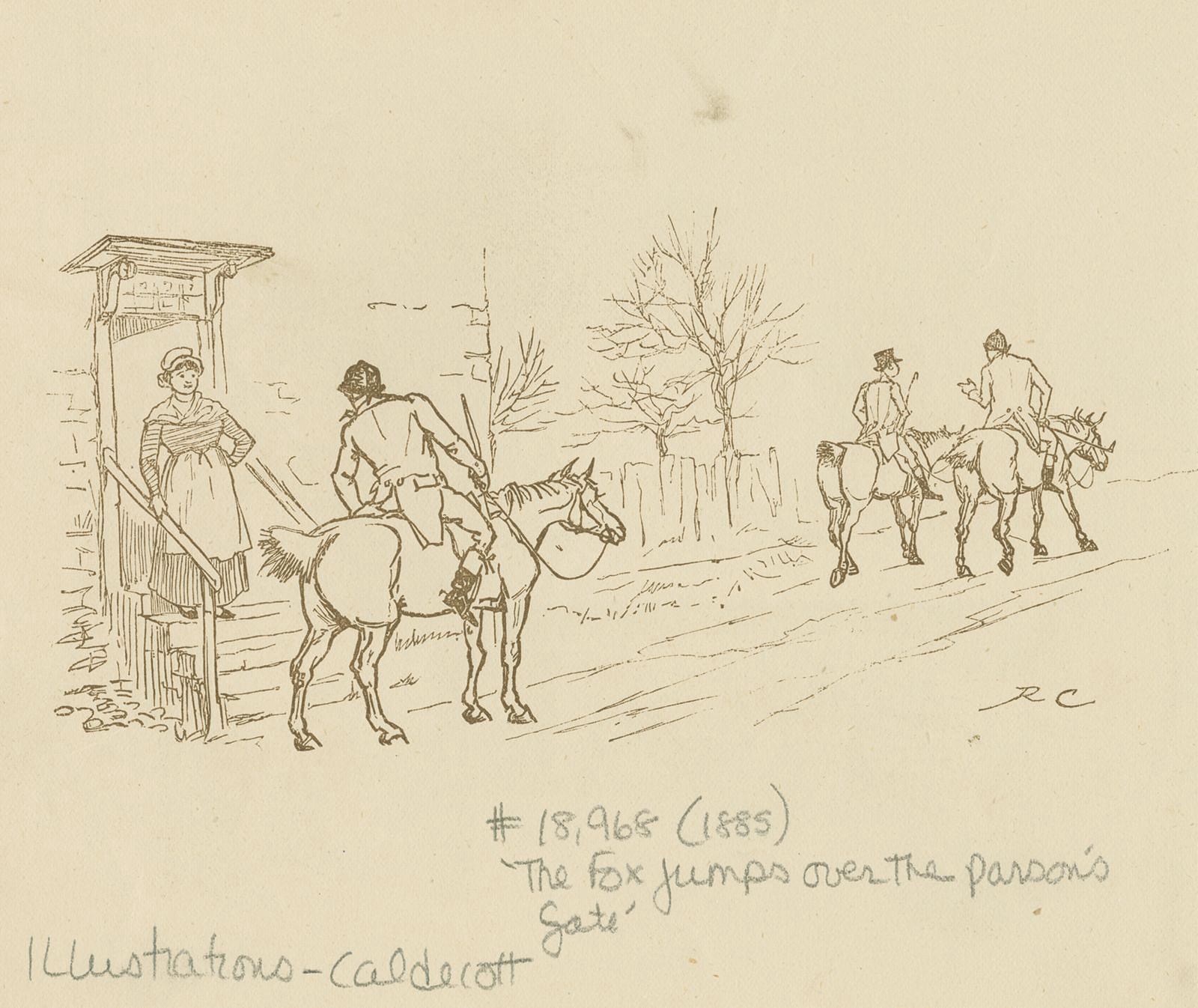
Randolph Caldecott: Taking leave. (1885)
"More complications sat between us and our exit."
We focused on leaving through the last half of our Exile. For over six years, The Muse schemed to position herself—us—where we could cleanly leave. In Takoma Park, Maryland, our starting point seemed impossibly far away from our target in Southeastern Washington State. A single hop home seemed unlikely to work from there. Further, after the first six years in Exile, we barely had our heads above water. We'd need more capital to achieve what we aspired for upon returning from our Exile. The Villa would need considerable refurbishment once we returned, and we'd learned that opportunities for accumulating wealth were few and farther between there than they would be almost anywhere else, like in Colorado.
Our first move took us to Colorado, then, where we figured we just might be able to swing purchasing a home.
ChristmasesPast
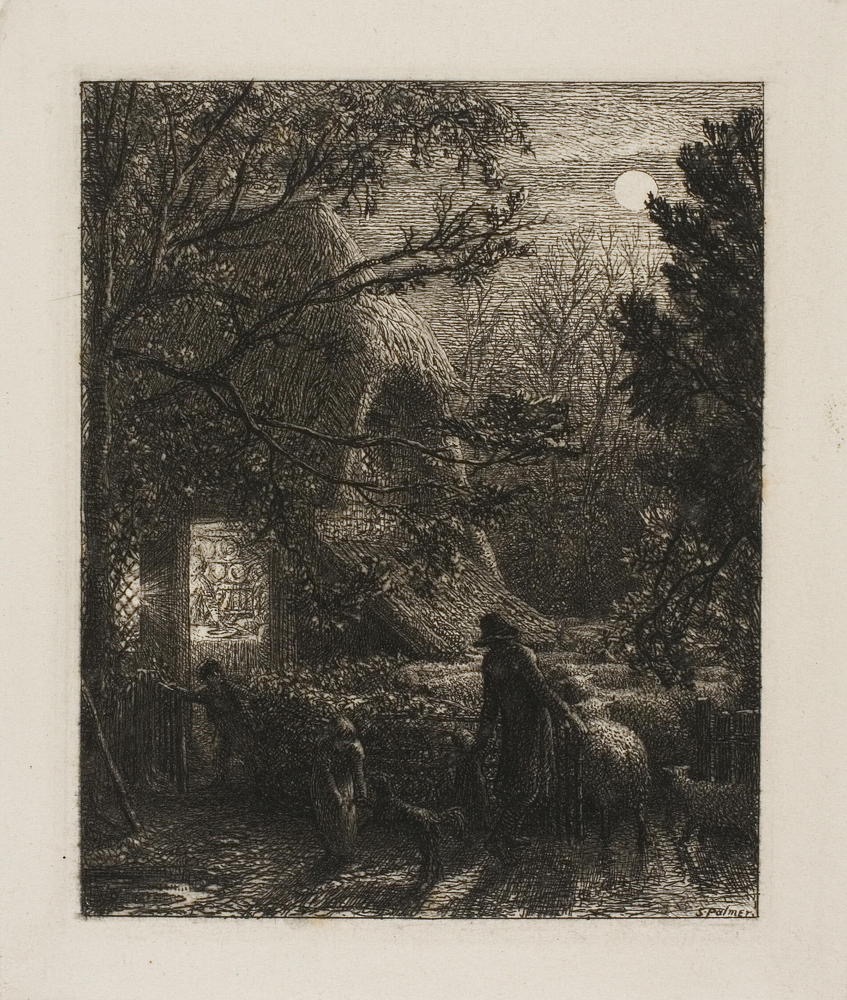
Samuel Palmer: Christmas (c. 1850)
"Our Exile was best when ChristmasesPast were the present."
The Muse and I didn't dwell day-to-day upon our dilemmas. We had our lives to live, Exiled or not, and the usual activities of daily living consumed most of our available attention. However miserable we might have become, we maintained a believable semblance of normalcy. Wee-hour thoughts rarely visited and never persisted into full obsession. We did not live lives of silent desperation. We were comfortable after a fashion. In some ways, we became more comfortable than we'd ever been before while we were Exiled, for some of the complications of regular life didn't haunt us in our absence. Our social obligations narrowed. Our acquaintances slimmed. We knew few. Our time largely remained our own. Once we developed routines, little further problem-solving was involved in our daily lives. It was sometimes like we had been furloughed from our regular life instead of being absent without leave.
When the Christmas season came, though, we teleported ourselves home.
Weekly Writing Summary For The Week Ending 12/12/2024
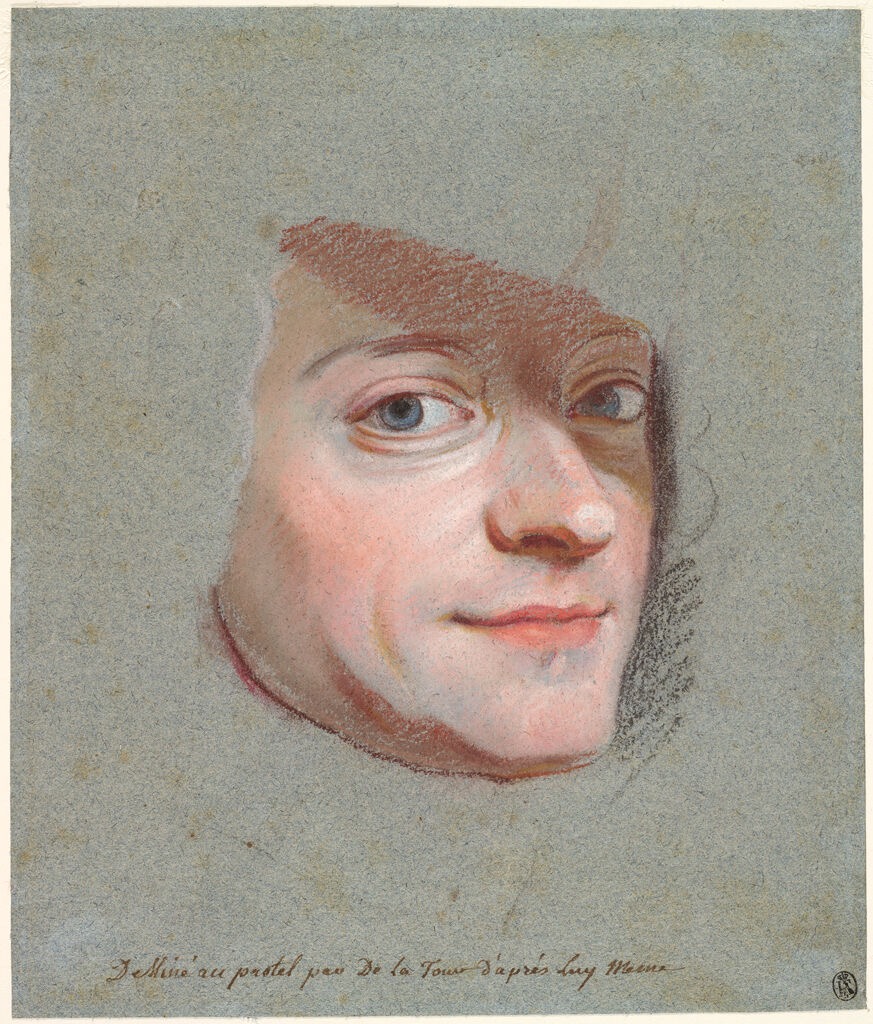
Copy after(?) Maurice-Quentin de La Tour:
Self-Portrait (18th Century)
Except For Occasional Reappearances
I took myself to lunch today, the busiest day of my week after the carpenters finally showed up this morning to begin installing our new porch deck. They'd hauled away the gold-plated deck boards—clear, verticle grain Douglas Fir tongue and groove three-inchers—a few weeks ago to sand and finish them in a heated shed. The boards returned transformed! We'd discussed the final details as light snow fell, and I left exhausted. I decided to take myself to lunch to purchase some respite. I went to the Sub Shop to order some of their chicken rice soup, which isn't soup so much as a thick goup, perfect for a chilling Thursday lunch. I ordered the soup and a half of a tuna sub. As she dished up my goop, the checker said she'd bring out my sandwich when it was finished.
I retired to a table in the back and enjoyed my goop, but my sandwich never came. I returned to the counter, and the checker reacted as if she'd never seen me. I responded to her asking how she could help by saying I was back for that half sandwich she'd said she'd deliver to my table. She looked astonished! "I wouldn't have said that," she replied, "because I don't deliver sandwiches to tables." She went on to ask what I'd ordered as if she were speaking to someone who had recently returned from the Twilight Zone. She turned to dish up the goop, and I stopped her, saying I'd already eaten my goop and just wanted the sandwich. She asked me what I wanted as if I had yet to order and paid for what I wanted just a few short minutes before. She took my order and passed it on to the sandwich maker, who had witnessed my earlier interaction. A minute or two later, she handed me the tuna in a to-go bag, though I'd ordered it for there, and, curiously, didn't charge me again for the sandwich she'd not acknowledged I'd earlier ordered and paid for. She'd even thrown a chocolate chip cookie into the bag. I retired to my table to swallow that sandwich, wondering.
The Muse has been out of town this week, so I've been lacking one of my usual verification mechanisms to confirm I'm present. Due, probably, to some Heisenberg factor, I might not actually exist unless observed by someone who knows me. My cats often perform this service, but in that sub shop, I was missing my verification medium and, therefore, experienced what it might be like without me being present. This episode perfectly encapsulated my Exiled experiences. You might recall the episode where I was feeding feral cats with a four-year-old. We named one of those cats The Cats Who's Never There. I got to experience how that cat must have felt. My certainty that he probably didn't exist and that raccoons were eating the food we left collapsed his existence wave, but only for me. For lunch today, I had a dish best never served, the sense that I might not actually exist and that I might have been permanently Exiled to someplace else, except for those occasional reappearances.
ConstantCompanions
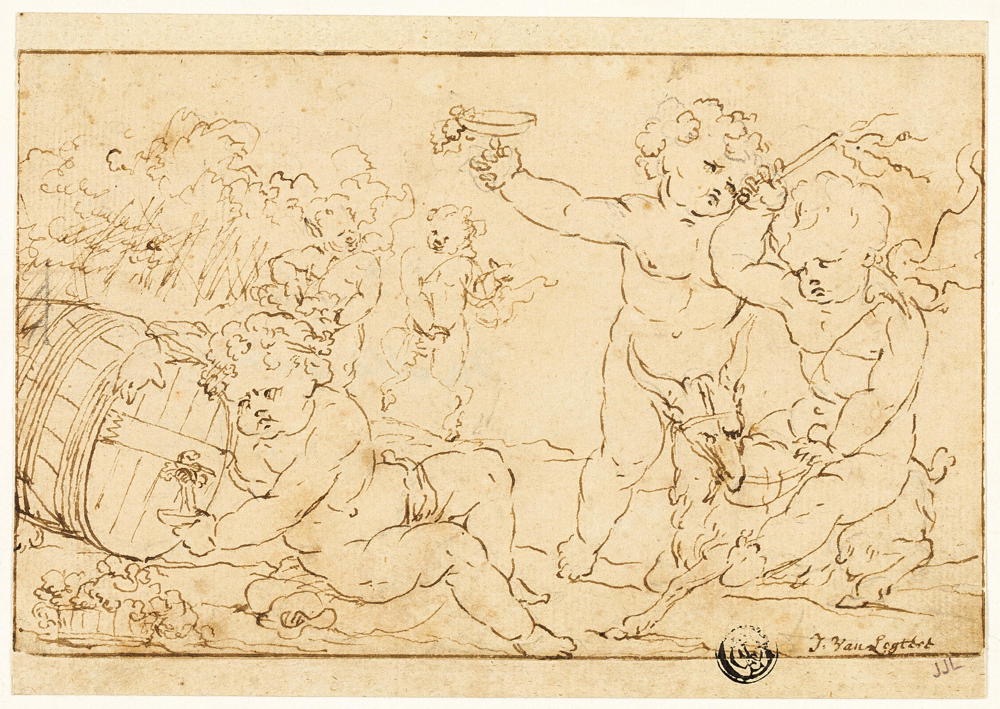
Possibly after Ignatius van Logteren:
Young Bacchus and Companions
(not dated- Early Eighteenth Century)
"He serves as a continuing inspiration."
My Exile was eased and occasionally burdened by the presence of ConstantCompanions in the form of two cats. Crash, the senior partner, had adopted me when I was recovering (poorly) from my second divorce. I suspect he recognized me as a fellow Exile and took to jumping up in my lap. I've always suspected that cats are clairvoyant or, if not, that they're not entirely subject to the same space/time limitations that contain us. I believe he knew what a remarkable companion he would become for me and chose that fate as an act of appreciation and service. He was a life-saver through those harrowing days when The Muse and I first found each other. We were both exiled then, and both were somewhat worse for the wear. Crash took great care of us.
Later, after we found The Villa and relocated to Walla Walla, we found our second cat, Rose, who was forever skittish.
FellowTravelers
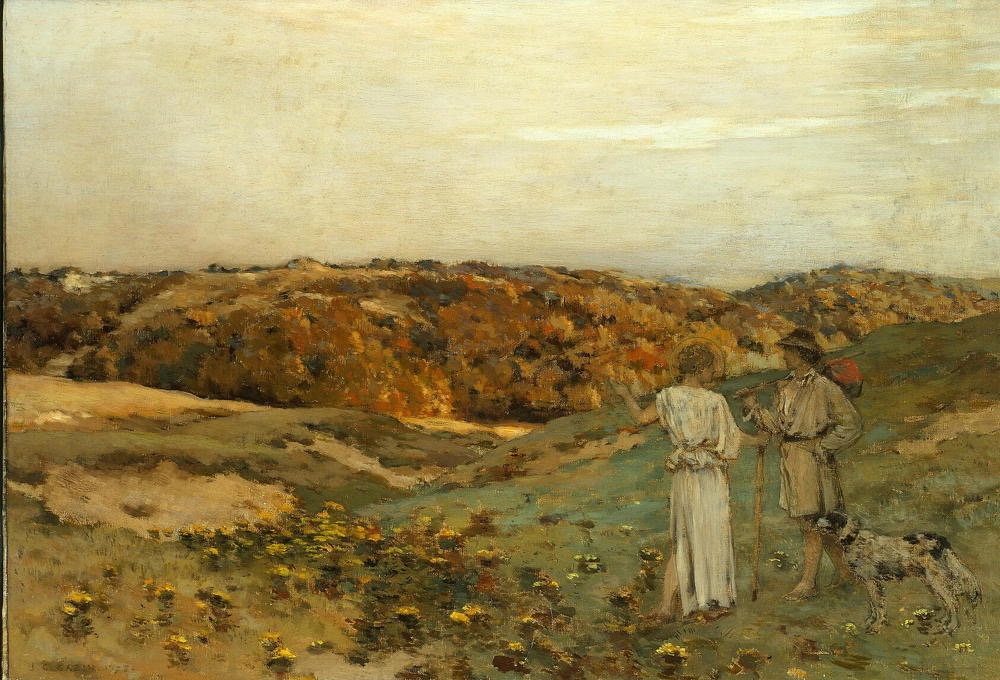
Jean Charles Cazin: Tobias and the Angel (1878)
Background Note:
Tobias and the Angel is the traditional title of depictions in art of a passage from the Book of Tobit in which Tobias, son of Tobit, travels with the Archangel Raphael without realizing he is an angel (5.5–6) and is then instructed by Raphael what to do with a giant fish he catches (6.2–9). The Book of Tobit is accepted by Catholic and Eastern Orthodox Christians as part of the biblical canon but not by Judaism or most Protestant Christians, the latter including it in the Apocrypha. (Wikipedia)
" … mirror images playing before us."
Those who have been Exiled develop an ability to recognize others who have been Exiled, their FellowTravelers. This fraternity was never anything anybody aspired to join. Each was conscripted, much as each was Exiled, not necessarily against their will but probably without anybody first asking permission. Being Exiled must leave similar wounds across its population. Exiled men, women, and children each seem to carry this common attribute. Time doesn't seem to affect its presence. Neither does any trauma related to the experience. For some, their Exile served as an escape; for others, an imprisonment, yet for both, the experience seems to leave similar indelible traces. It's rare that anyone quickly discloses their personal experience with Exiles. Most keep this story secret until the listener can be fairly classified as an intimate. Yet when the disclosure finally emerges, the previously Exiled listener will probably experience an I Knew That Moment. They realize that they knew without being able to assign an explicit label to that sensation.
We're all connected in myriad ways.
Arrogance
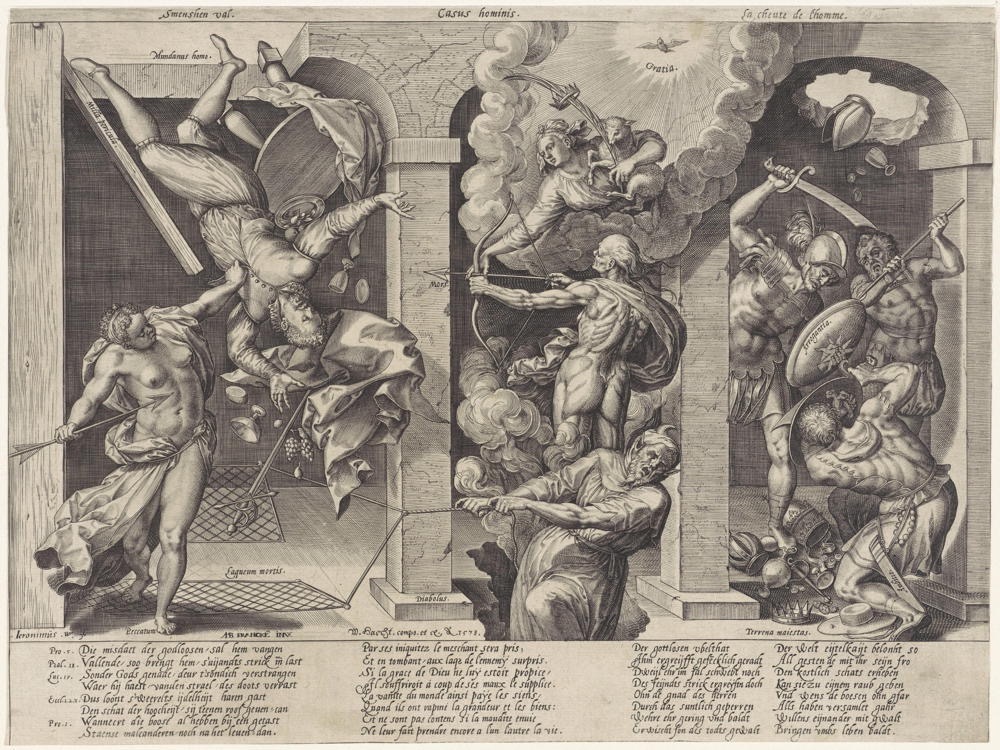
Hieronymus Wierix: Val van de mens [The Fall of Man] (1578)
Allegorie op de ondergang van de mens. De Wereldse Mens (Mundanus Homo) valt met tafel en al door het geopende luik in de vloer. De duivel (Diabolus) houdt zijn netten gereed om hem te vangen. Een naakte vrouw, de Zonde (Peccatum), trekt de Wereldse Mens aan zijn jas, zodat ze hem met haar pijl kan doorboren. In het midden richt de Dood (Mors) zijn pijl op de vallende man. Hij wordt tegengehouden door de Goddelijke Genade (Gratia). Boven haar hoofd de duif van de Heilige Geest. Geheel rechts vechten Arrogantie (Arrogantia), de man met helm, schild en opgeheven zwaard, Eerzucht (Ambitio) en Geweld (Violentia). Ze strijden om de aardse rijkdommen die van het bed van Vanitas door het gat in de vloer zijn gevallen. De voorstelling wordt verduidelijkt in de Nederlandse, Franse en Duitse onderschriften in de marge.
Allegory of man's demise. The Worldly Man (Mundanus Homo) falls into the floor with the table and all through the open hatch. The devil (Diabolus) keeps his nets ready to catch him. A, Sin (Peccatum), pulls the Worldly Man by his coat so that she can pierce him with her arrow. In the middle, Death (Mors) points his arrow at the falling man. He is held back by the Divine Grace (Gratia). Above her head, the dove of the Holy Ghost. On the far right, fight Arrogance (Arrogantia), the man with helmet, shield, and raised sword, Ambition (Ambitio), and Violence (Violentia). They compete for the earthly riches that have fallen from Vanitas' bed through the hole in the floor. The performance is clarified in the Dutch, French, and German captions on the margins.
—
" … an infantile worldview and a wound that could never heal."
The Exiled exhibit a common Arrogance. The act of being Exiled feels undeserved. Consequently, the Exiled feel wronged. They believe themselves to be, as a class, innocent parties. Nothing better fuels an Arrogance than having been unjustly punished. The Exiled feel almost saintly superior in their anguish. Many carry a martyr complex. The world they've been cruelly forced into feels far beneath their station. Having been coerced into abandoning the center of their universe, they recognize how everything in the Exiled-Into hinterlands stands well beneath their standards. Forced to live among the rabble, the Exile might seem withdrawn. They are probably not as shy as they first appear. They are seething and have no idea what rules govern their presence there. They feel embarrassed.
Washington, DC, might seem like a shining city surrounding Capitol Hill until you search for an apartment on the backside of that shining hill.
Impermanence
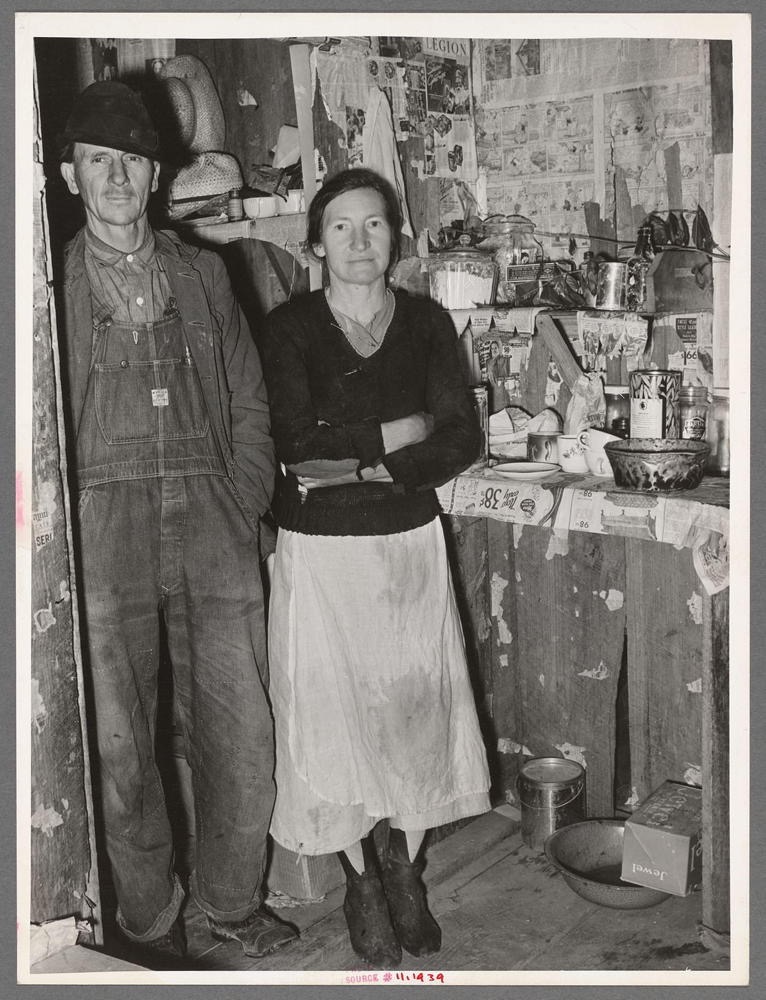
Lee Russell:
Migratory berry pickers in temporary home
near Ponchatoula, Louisiana (1939)
[United States. Farm Security Administration]
"My sense of Impermanence gratefully proved impermanent itself."
A fundamental paradox of living involves the necessity of seeing the temporary as somehow permanent. Life is a wasting state, destined to end eventually, but living seems best served when presumed to be permanent. We don't take the temporary as seriously as we take the eternal; just a subtle reframing materially transforms experience. We live in a too-disposable era where many things come in single-use packaging. We've grown too used to discarding so that we too easily perceive even our precious, non-refundable minutes as somehow disposable.
When I was Exiled, my life seemed to go off the books.
Untreatable
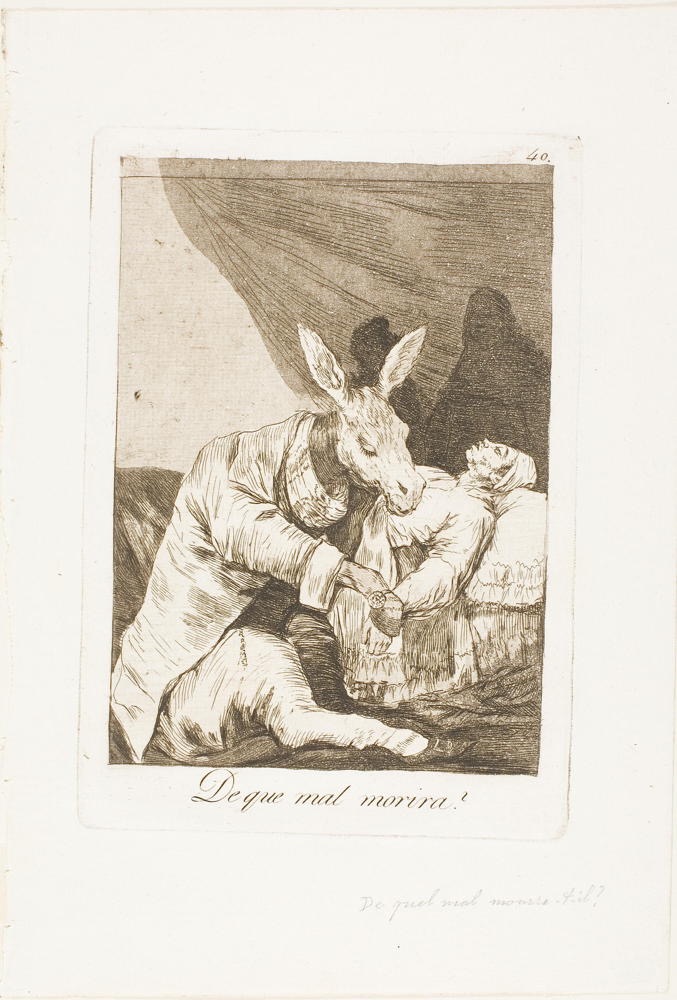
Francisco José de Goya y Lucientes:
Of what ill will he die?, plate 40 from Los Caprichos
(1797–98, published 1799)
" … the lesson that seems to need to be relearned anew every time."
Being Exiled does not amount to a treatable condition. It is not a problem requiring a solution, though I first considered it a serious problem. I spent considerable nonrefundable time needlessly and fruitlessly seeking a solution. My life became a parody just as certainly as if I had awakened to find myself cast in an old I Love Lucy episode. This experience might have been tragic. Indeed, it seemed as though it certainly could have become tragic. That it didn't, or eventually didn't, amounts to a form of magic. I certainly contributed to the comedy of errors. I sought salvation from what I might have more productively considered a mere flesh wound, a scratch. I blew my condition out of proportion and then blamed the Gods, the universe, or my ineptness for cursing my meager existence. I felt cheated, wronged, and violated. I was the one wielding the weapon, though. I was burgling myself unawares.
In this life, stuff happens.
Reappearing
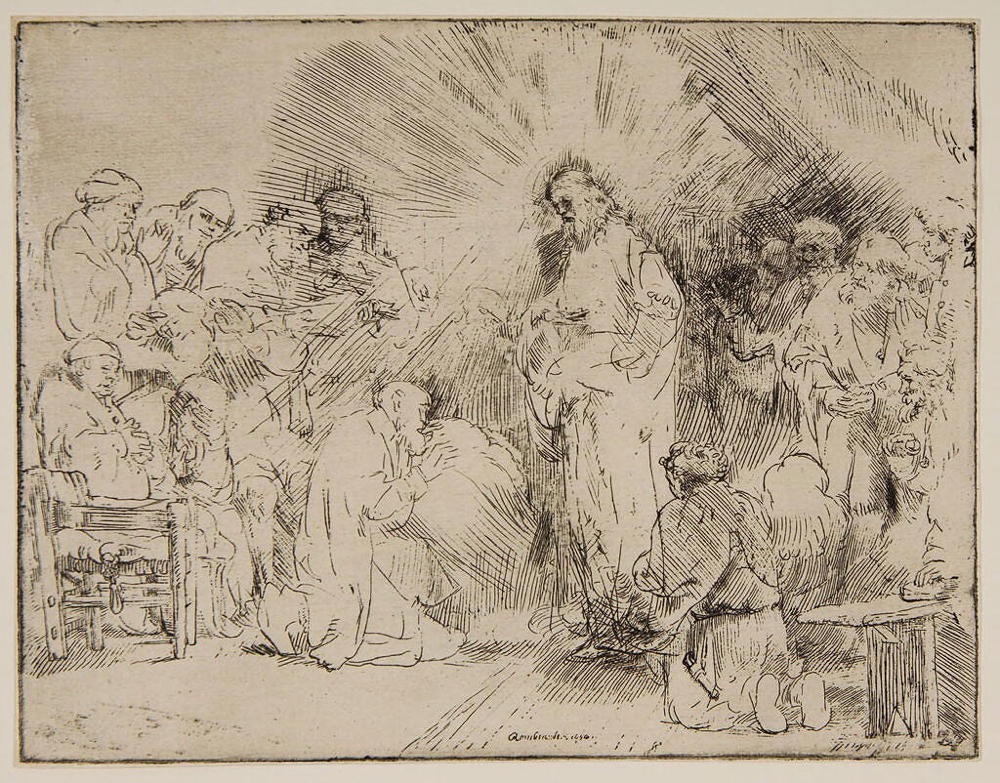
Rembrandt Harmensz. van Rijn:
The Incredulity of Thomas
["Christ Appearing to the Apostles"] (1656)
"Home seems less where the heart grows fonder than where one's pasts live …"
After Being Exiled, The Muse and I occasionally Reappeared on our old home turf. We came for various reasons, usually to see family, though I also once came alone to repaint the Villa. I'd slip down to the Main Street Starbucks at 5 AM to swipe some wi-fi and post my latest dispatch. I would inevitably get spotted by somebody from my former existence. I would get the opportunity to explain where I'd gone and what I was doing returning. Somebody would usually ask if we'd come back, but I'd have to admit we hadn't. Not yet. We'd recount a few of our former misadventures before disappearing into the ether again. I'd run into old friends wherever I went, even visiting my mom in the old folks' home. Another inmate's kid or a staff member knew us under other circumstances and usually asked after us.
Our stories always seemed pretty lame to us.
Weekly Writing Summary For The Week Ending 12/05/2024
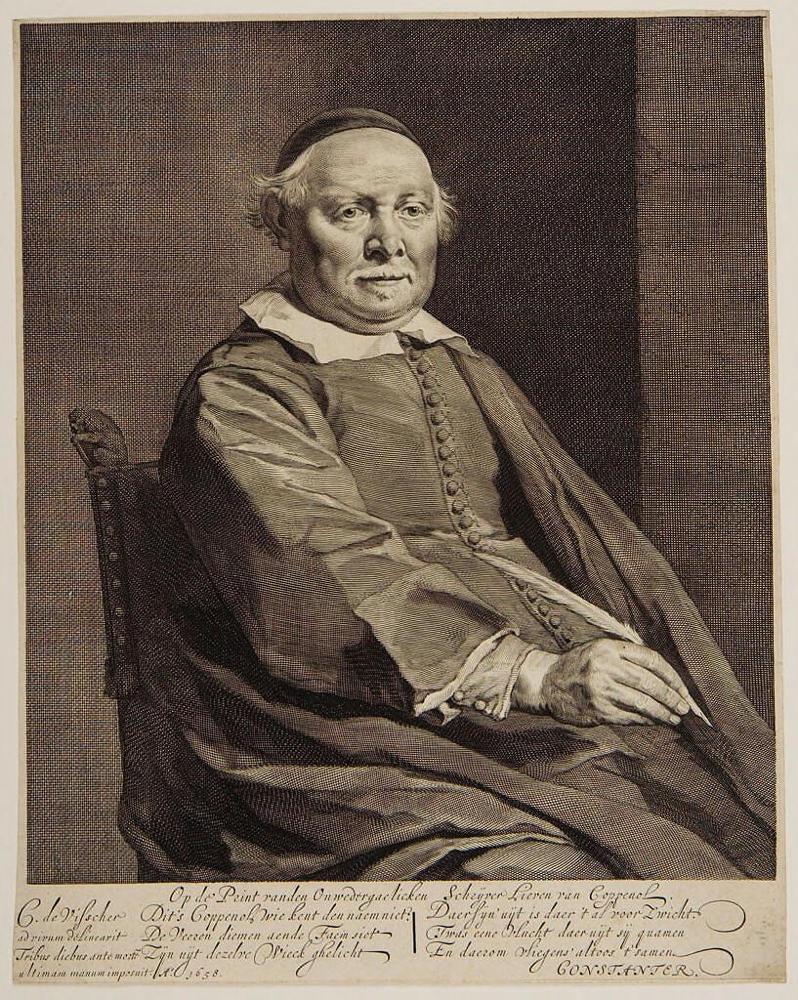
Cornelis Visscher: Lievens van Coppenol, Writing Master (1658)
Muster An Effective Resistance
As Winter approaches here, a persistent inversion layer appears. It brings low cloud and consistent temperatures that very slowly work their way downward toward freezing. For weeks, temperatures might hover in the low thirties without actually freezing. The petunias have not yet been frostbitten, nor have the geraniums. Their days will come as December unfolds. Genuine cold will arrive, and the fireplace will become the center of our lives again. This old house becomes its coziest when it's coldest outside. Sure, a place this ancient leaks a lot. A more or less subtle yet constant breeze discloses its respiration, but it's nothing that can't be cured by putting on another sweatshirt.
The Muse becomes even more the South Dakota Farm Daughter when this weather arrives. She bakes her pies and buys a hog's head to render into head cheese and souse. She finds poppy seed for Stölen-making, and we continue experimenting to find better ways to shell fresh chestnuts. The outside world seems as though it's upside-downing itself, preparing for a new administration spouting absolutely insane notions. Another inversion, with temperatures hovering just above chilling. It remains out-there as it has always been in-here. This time of year, we might just as well celebrate something as collapse into tears. We celebrate being here, at the right time and place for a change, rather than Exiled. Exile might come again next year. For now, we're still here, having so-far survived. The outside might rage in impotent insistence. We can muster an effective resistance.
Mine

Kate Greenaway: Baby Mine (1910)
Edmund Evans, Wood Engraver
"I haven't quite yet gotten over it."
Being Exiled eventually reframed my notions of possession. Before, I held a narrow idea of what belonged to me. Besides books, I never cared much for possessions. After Exile, I held onto my collection of books until just before we relocated to Colorado, when I gave away at least a quarter of my collection to the Takoma Park Library fundraising book sale to avoid moving so many. I took to borrowing books from libraries instead of buying them, and I grew to feel that I came to own any book I'd read and even those I'd just perused. Before Exile, I'd also imprinted on our home as our possession. This relationship was a unique one. I felt more the steward than the lord of that manor. That possession was more obligation than anything else. Exile left me feeling as though I was neglecting that obligation.
My relationship with real estate shifted when we bought that second house in Colorado.
Never_Returning
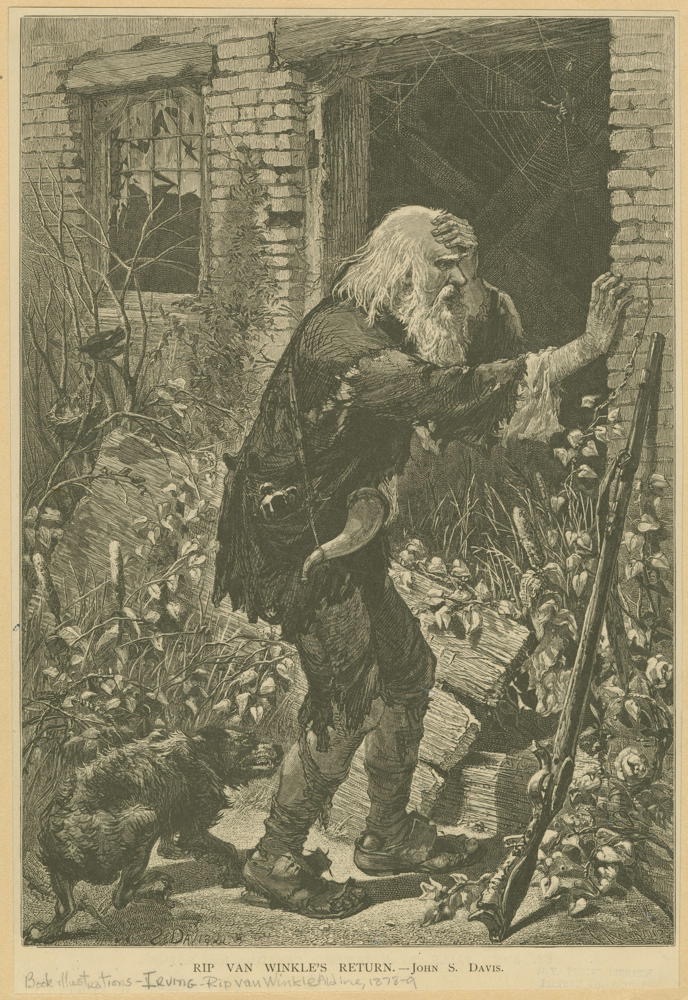
John Steeple Davis: Rip Van Winkle's return. (1879)
Charles Maurand, Wood Engraver
"We returned sequestered and suspicious if we ever returned at all."
At some point after we'd relocated to Colorado for what we imagined would be the final part of our Exile, I started believing that we would be Never_Returning from that excursion. Our source had by that time changed too much for me to believe that we might find enough recognizable remnants of our former existence to believably argue that we'd returned, for time and passing circumstance had already pulled that rug out from underneath us by then. I didn't necessarily view this realization as tragic, for it seemed simply inarguable. We had once imagined we would one day return. Then we came to understand that returning might have never been in the cards, that the plane within which our return might manifest might have evaporated like a wave function upon the moment of our exit. Only constancy of perception could have ever argued otherwise. That constancy almost always proves to be little more than an illusion, albeit reassuring, until it isn't any longer.
If I'd been baited and switched, I had baited myself.
Explorers
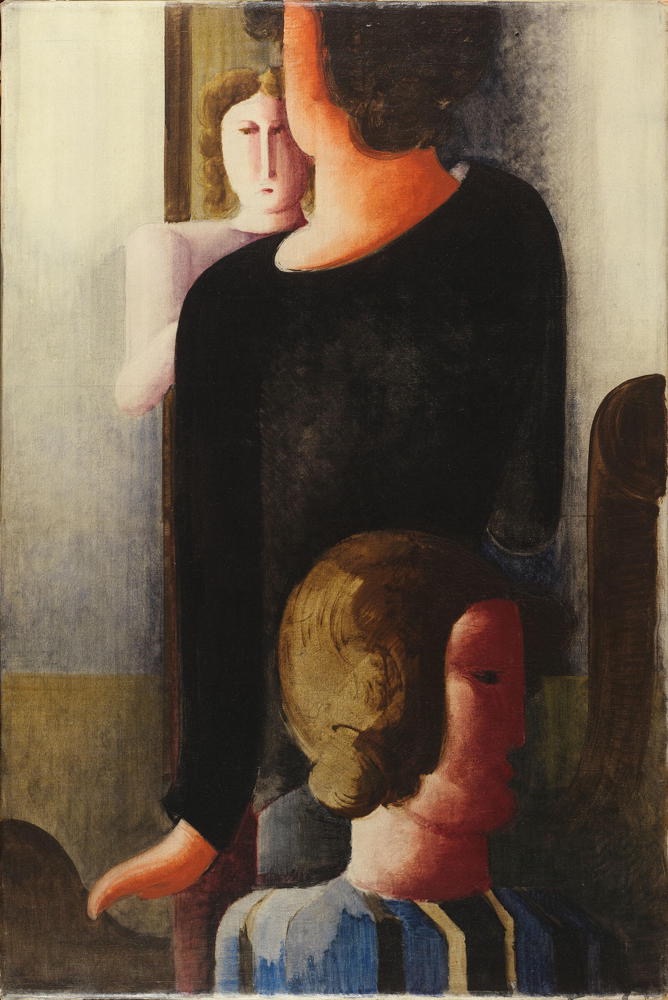
Oskar Schlemmer:
Three Figures with Furniture-like Forms
[Drei Figuren mit Möbelformen] (1929)
"That wanderlust has largely left us since we returned from Exile."
Exploring became one sure way to distract ourselves from often depressing realities after being Exiled. We could go discover something. Though earlier explorers had already discovered every possible thing, our surroundings were new to us; strange customs always surrounded us. We were looking for roads less traveled since traffic seemed to be the most significant barrier to going anywhere. We learned when to avoid the freeways and when they might be okay. We'd often chart a course around the most direct route since they frequently proved to be the most significant hassle. If everyone's discovered a shortcut, it takes longer. We ached to discover our own secret passages.
We kept our navigating systems offline when Exploring because we didn't want The Cloud to learn and then advertise our secret shortcuts to anybody else.
SnappingBack
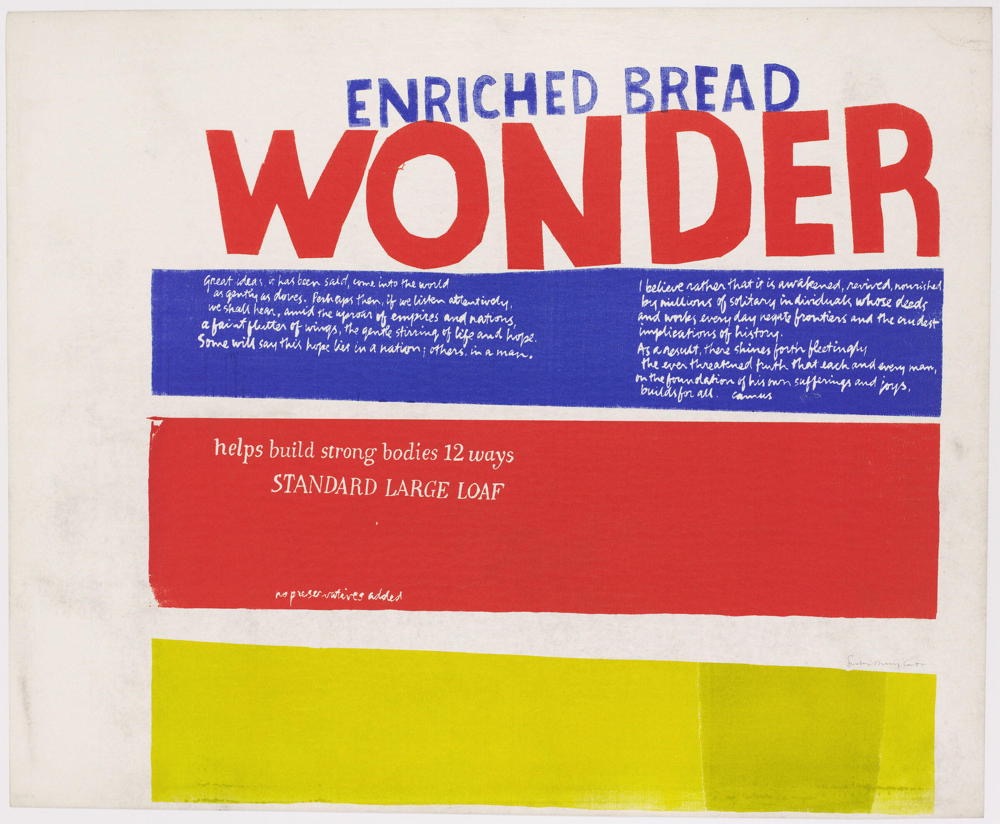
Corita Kent (Sister Mary Corita): enriched bread (1965)
Inscriptions and Marks:
Signed: l.r., in black ink (ball point): Sister Mary Corita
Inscription: ENRICHED BREAD / WONDER / Great ideas, it has been said, come into the world as gently as doves. Perhaps then, if we listen attentively, we shall hear, amid the uproar of empires and nations, a faint flutter of wings, the gentle stirring of life and hope. Some will say this hope lies in a nation; others in a man. I believe rather that it is awakened, revived, nourished by millions of solitary individuals whose deeds and works everyday negate frontiers and the crudest implications of history. As a result, there shines forth fleetingly the ever threatened truth that each and every man, on the foundation of his own sufferings and joys, builds for all. Camus / Help build strong bodies 12 ways sTANDARD LARGE LOAF no preservatives added
Inscription: On verso, l.l.: 65-2
" … still in more or less one piece."
When we were Exiled, losing my DelicateBalance and slipping into LostDays rarely lasted long. We would shortly be SnappingBack into more fully functioning organisms. Just the continually threatening nature of being Exiled sort of insists upon the Exile's full functionality. Days lost cannot turn into lost weeks without increasing the already screaming threat level. We had defenses to handle and offensives to scheme. Exiles do not simply take care of themselves. As with everything, there's always something insisting upon attention, threatening an already tenuous homeostasis. Remember, we had chosen not to be mere renters, so we needed to maintain that all-important owner mentality. We had responsibilities! However powerless or exhausted we might have felt, no excuses could have worked. Like our pioneer ancestors, we'd get back behind the plow mule again, usually by the following morning.
Our discipline doubtless helped us recover after we'd stumble.
LostDays
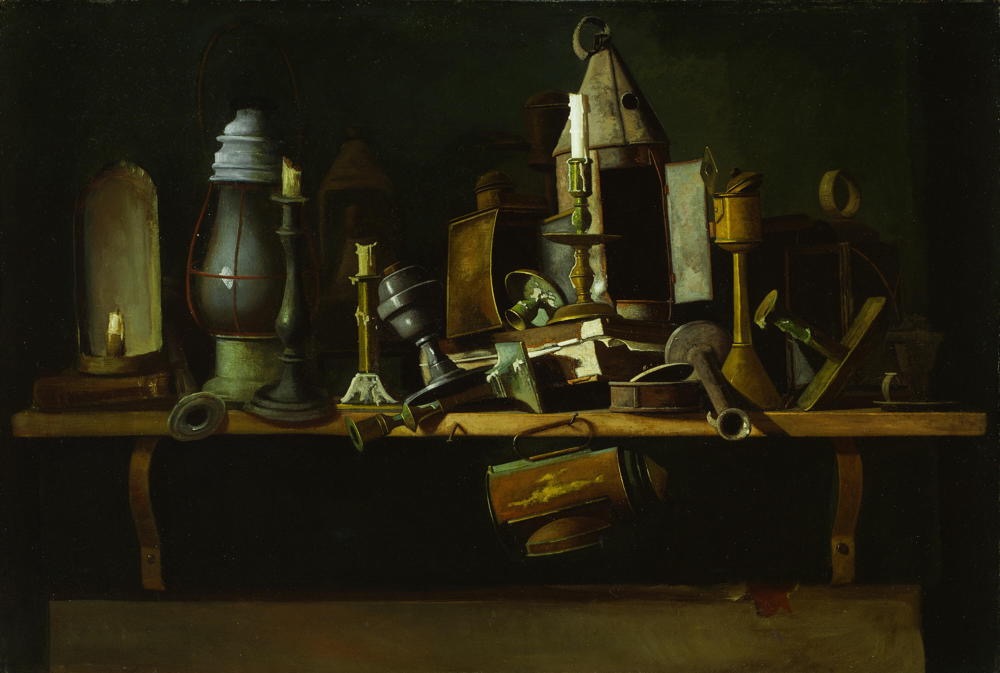
John F. Peto: Lights of Other Days (1906)
" … a familiar part of our regular repertory."
Lest any reader of these chronicles receive the impression that The Muse and I were exceptionally courageous or virtuous after being Exiled, I must note that we experienced at least our share of LostDays there. Sundays seemed to have presented particular problems for me, for I couldn't seem to settle into any rhythm for them. Separated from my weekday routines and alienated by bizarre local rituals, I often felt like the odd man out on Sundays. Both DC and Denver exuded football madness in season, an attraction I never even wanted to muster. There are rituals that inhabitants of big cities observe that nobody not of those places can ever come to understand. The Sunday morning church bells served to alienate me further there. Our small hamlet outside of Denver featured a mega-church with parishioners in the tens of thousands among its half-dozen affiliated campuses spread along the front range. Whatever might have occurred in their sanctuary, they reliably produced a mega-traffic jam every Sunday at noon. We were wise to head in the other direction.
I mentioned in an earlier installment that shopping seemed to be the entertainment of choice for those living anywhere near shopping centers.


